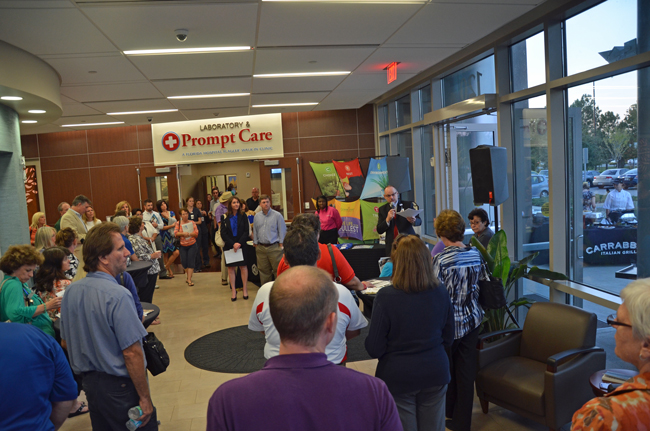
Starting Monday, the Flagler County School Board—the county’s largest employer—and Florida Hospital Flagler are starting their own experiment in health care: More than 80 percent of the district’s 1,700 employees will be urged to shift their primary care to the hospital’s new Prompt Care clinic on Cypress Edge. The district approved a $288,000, one-year contract with the hospital on Oct. 15 as part of the district’s new, self-insured health plan with United Health Care.
It’s the latest attempt to control insurance premium costs that have been grinding at employees’ paychecks enough to erase what raises they’ve received. By shifting employees from individual physicians to a group clinic, the district hopes that despite the up-front cost, its long-term costs will fall. One way for that to happen is to convince enough employees to make the switch. There’s no guarantee that it’ll work, but indications suggest it will: Flagler County’s employee clinic, started almost three years ago, now draws participation from three-quarters of its employees.
“That’s what happened to school district throughout the state that have moved to a self-insured plan,” School Superintendent Janet Valentine said, “going with the clinic, whether it was a partnership with someone else or whether it was their own clinic, run by the school district. There’s a lot of unknowns here, but Florida Hospital Flagler has been a great partner.”
Florida Hospital Flagler hosted an open house for district employees Tuesday evening in the lobby of its relatively new facility at Parkway medical Plaza, drawing a considerable crowd over two hours in the evening.
“It’s been a discussion each year,” School Board Chairman Andy Dance said of a potential partnership with the hospital: the district has discussed it for the last four years. “But the time has come. This is the right time to get this going for employees. Personally for me, I think I’m the poster child for needing to make better healthy choices, so I’m ready to go forward and lead by example. I’ve set my appointment, and I’m ready to come in a couple of weeks and go through the process here and get my check-up. I encourage everybody, all of our employees, to do the same thing and be pro-active in our personal health care. I’m looking forward to getting started and making better choices.” (Speaking of examples: the school board itself of course could get started by eliminating that salt-rich, fat-calorie-filled pot of junk food readied for each members’ munching at every board meeting.)
It will, however take a change in culture, Florida Hospital CEO Ken Mattison said.
“That’s not something that we can impose on you,” Mattison told the employees gathered for the open house. “That is something that you need to participate in. But when you’re ready to start making better health choices, we want to be there for you and we have programs that can help.” He is not discouraging employees from continuing their relationships with other primary care physicians. The contract with the hospital is conditional enough that those relationships for most employees will continue to be necessary. But the clinic would be a first point of care for a large number of services, reducing out of pocket costs.
One signal difference: clinic visits cost nothing. No co-pay, no future bills. For most employees visiting a primary care physician, there’s a cop-pay of up to $40 per visit.
“You’re not going to find us advertising our wait time out on the Interstate with billboards but we want you to know that our commitment is to provide prompt care so you can get back to the things that are important to you,” Mattison said.
The contract with the hospital (see below) lays out the conveniences, but also the restrictions.
Those seeking out care at the clinic can have their chronic illnesses treated, such as diabetes, hypertension and high cholesterol. Acute and minor illnesses such as fevers, sore throats, sinus infections and urinary tract infections are covered, as are EKGs, the suturing of minor laceration and annual physicals. But beyond that, other needs must be covered elsewhere. Employees’ children must visit their own pediatrician for wellness and immunization, though they can get other services treated at the clinic.
And visits to Prompt Care must be scheduled within the clinic’s hours as set out by the contractual agreement: Monday through Friday from 3 to 6 p.m., Tuesday from 7:30 to 8:30 a.m., and Wednesday and Thursday from 11 a.m. to 1 p.m. The district and the clinic expect that four employees will use the services for every hour offered. That doesn’t mean that employees are barred from the clinic at other times: the clinic itself is open weekdays from 7 a.m. to 7 p.m. and Saturday from 8 a.m. to 4:30 p.m. But for those employees coming in outside the designated hours, they’ll be seen as walk-in patients “if scheduling allows,” the contract states, and “all services received in this manner will constitute Non-Covered Services.”
The clinic also includes lab work and radiology, but also with restrictions on times and services.
“It is our intention that for anyone who chooses, that this will become their primary care home. I just made my switch tonight,” Valentine said Tuesday evening. “It’s going to allow us to save the dollars that we want to save. It’s going to force us and allow us to take a look at the individual costs, it’s going to allow you to walk in the door and not have a co-pay, which is going to put money back into our employees’ pocket. So take advantage, tell your friends, tell your co-workers, tell your administrators, and we’re going to pass the word, and I think that’s exactly what happened tonight and why we got so many folks here.”
Mattison concluded: “I have found that if you create a culture, an appealing, pleasant environment, and you staff it with people that are concerned about efficiency, that are concerned about how we can improve the health of the people in the community, that it doesn’t become a coercive experience. People don’t have to feel like they were forced. You’ve created an environment where they will choose, I believe, to make better heath choices themselves. And to align with people that can help them along their health journey. That’s what I see happening here.”
For Trevor Tucker, the school board’s chief bean-counter, it’s about the dollars eventually saved. “I’m hoping this will bring down costs and drop these ridiculous 16 percent a year insurance cost increases,” Tucker said.
![]()
Flagler School District Prompt Care Agreement With Florida Hospital Flagler





























Since When says
Sooooo the tax payer gets a double whammy. Raises for everyone and a free clinic, compliments of yours truly. What about everyone else? Can Joe Schmo opt in, it is afterall his money.
Average Fella says
Just to inform you when the district decided to take on a self insured plan they raised all premiums.The district doesn’t know where most claims will be spent.But I think it is wise to have a clinic to cut down on emergency room visits( which can run into the thousands) and well visits and labs can work to be preventative for much more serious illness’ later.
I make a little over ten dollars an hour and factoring in the insurance premium increase WITH my raise I make 50.00 LESS than I did last year. I thought I was a Joe Schmo rather than a Donald Trump.
Bob Z. says
I think that they should give every employee a stipend equal to the monthly benefit they already get and let them obtain their health coverage via the ACA, just like many large employers are already doing. Or they could reduce the stipend a little and provide the walk-in clinic as well.
A.S.F. says
Let’s hope this doesn’t turn “Prompt Care” into “Swamped Care.”